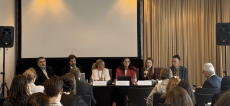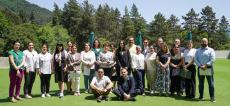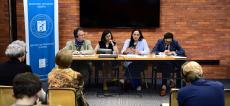
2020: Freedom of Religion, Xenophobia, Rights of the Migrants
December 10 marks International Human Rights Day. The current year has been particularly problematic in Georgia in terms of human rights protection and equality. The Covid-19 pandemic and its consequences severely affected vulnerable groups. The current situation has highlighted a number of systemic problems in the human rights field. The state failed to ensure freedom of religion and belief for all, neglected equality between religious communities, and the separation of religion and the state. The ongoing pandemic intensified the hate speech, which was especially acute towards ethnic Azerbaijani and Muslim citizens. The coronavirus pandemic has further aggravated the social and human rights situation for migrants living in Georgia.
Freedom of Religion and Belief
The measures taken by the state in response to the COVID-19 pandemic have resulted in the discriminatory statements and differentiated decisions of the government towards the Georgian Orthodox Church and other religious organizations.
On March 21, 2020, a state of emergency was declared in Georgia, which lasted two months. During the state of emergency, the state has not developed special regulations and/or recommendations for religious organizations. Representatives of minority religious groups noted that the government's approach was discriminatory, which became more obvious in light of the State’s negotiations with the Patriarchate of the Georgian Orthodox Church and the privileges granted to the latter. [1]
The discriminatory approach to religious organizations during the state of emergency continued to a later stage. Under the new restrictions imposed in November, only the night of January 6 (when the Georgian Orthodox Church celebrates Christmas) was considered as an exception to the ban on movement in the public space, reaffirming the discriminatory treatment of non-dominant religious organizations by the authorities.
The State Agency for Religious Issues under the auspices of the Prime Minister has not issued any statement or recommendation during the state of emergency, although its mandate is to develop recommendations on religious issues. This year, it was reaffirmed that the goal of the Agency is the differentiation of religious organizations and interference in the autonomy of minority religious groups, rather than the protection of religious freedom and equality.
Selective state policy was accompanied by discriminatory statements by high-ranking officials. On April 14, 2020, on the occasion of the celebration of Easter by the Orthodox Church, the Prime Minister said that the churches would not close: "We have always had to find a balance and I am sure we will find it together with the [Georgian Orthodox] Church ... as we are an Orthodox State." By recognizing the confessional nature of the state, the head of government grossly disregarded the Constitutional principle of separation of state and religion and acknowledged the superiority of one faith, including the supremacy of religious organization over the state institutions. [2]
In addition to the Prime Minister's statement, the position of Vice-Prime Minister Maia Tskitishvili is also extremely problematic. On November 27, when justifying the exceptions granted from the prohibition of movement in the night hours, Maia Tskitishvili explained that this was due to the fact that the majority of the Georgian population is Orthodox. [3] This statement also clearly indicates that the government makes decisions only from the perspective of the majority and divides people into first and second-class citizens.
The rights of the university applicants, who were taking the national exams, have also been violated this year. The applicants could not take the exam on Saturday because of their religious beliefs and therefore appealed to the National Assessment and Examinations Center (NAEC) to reschedule their exam. The NAEC rejected the student’s request. TDI appealed to the court, which ordered the NAEC to reschedule the examination for the entrants to another day. [4]
In 2020, the court hearing on the Batumi New Mosque construction case has continued. In 2019 the Batumi City Court found the City Hall’s refusal to grant the mosque building permit illegal and discriminatory. The dispute, however, was moved to the Court of Appeals. In 2020, the Kutaisi Court of Appeals held two sessions however completion of the case is being protracted. [5] Meanwhile, the freedom of religion and belief of Muslims is being continuously violated - they have not been able to build a new mosque since 2017 and are praying in the open air.
In May of this year, the Constitutional Court of Georgia admitted the constitutional claim of nine religious organizations for consideration on merits. The claim challenges the normative content of the contested norm allowing differential treatment of religious organizations other than the Georgian Orthodox Church, as a result of which only the minority religious organizations pay the land tax. The case is still pending in court. [6]
The second constitutional claim of religious organizations is also being pending. The claimants sought that the Constitutional Court declares those norms of the Law on State Property discriminatory which restrict the right of religious organizations, except for the Georgian Orthodox Church, to purchase or exchange State-owned property.[7]
On May 22, 2020, the Parliament of Georgia adopted a law, according to which it became possible for the Georgian Orthodox Church to receive the state forests into ownership. The Parliament of Georgia approved these amendments during the state of emergency caused by the Covid-19 pandemic. As a result, inequality between religious organizations deepened and the violation of State-Church separation was revealed once again. [8]
Hate Speech and Xenophobia
During the crisis caused by the COVID-19 pandemic, xenophobic attitudes towards ethnic and religious minorities became even stronger, which was manifested by numerous waves of hate speech. In addition to the xenophobic comments on the social networks, statements made by public figures and politicians containing hate speech and discrimination remained problematic.
In the spring, the Georgian government declared Marneuli and Bolnisi municipalities as quarantine zones. Following the confirmation of coronavirus cases in these regions, hate speech and incitement to discrimination against the ethnic Azerbaijani population were spread in the society, especially in social media. [9]
The director of the National Center for Manuscripts made a hateful comment, noting that residents of the Marneuli village should be "locked up and killed", which was accompanied by swearing. [10]
The statement made by Amiran Gamkrelidze, director of the National Center for Disease Control should also be noted, [11] for which he later apologized. Gamkrelidze stated that according to the information provided to him, the local Muslim spritual leaders "play a bad role" in the quarantine zone.
The political party Alliance of Patriots, which had seats in the Parliament of Georgia, had been actively using xenophobic and Turkophobic rhetoric in the run-up to the elections and insighting religious and ethnic hatred. [12] The pre-election video ads of the Alliance were also xenophobic. At the same time, the party leader Irma Inashvili [13] stated that the economic and ideological expansion of Turkey in Adjara had intensified, therefore, we must defend Adjara and Georgia. In addition, the Alliance of Patriots placed a banner near the Georgian-Turkish border in Achara[14] saying: “Protect Achara! Protect your share of Georgia!” The banner depicts a map of Georgia, where Achara is displayed as an occupied territory.
The statement of the Georgian Orthodox Church Bishop of Marneuli and Hujabi, Giorgi Janmdeliani [15] on the rehabilitation of the Nariman Narimanov monument by the local self-government is also noteworthy. in his Sunday sermon on May 24, 2020, the Bishop said - "If the Georgians have any dignity left at all, then the monument of our enemies should not be erected in the middle of the city. This is a great insult to our statehood. This is the spitting in the soul of our ancestors." [16]
The statements of the bishop were soon supported by the so-called Georgian March and other radical extremist groups and were followed by the aggressive campaign on social networks.
On May 30, the State Security Service started an investigation into the above-mentioned issue under the article of racial discrimination, however, the purpose of the investigation was not clear. The Security Service had been summoning the Muslim Sheikh Mirtag Asadov and ethnic Azerbaijani activists of Kvemo Kartli for interrogations. Because the purpose of the investigation is unclear, there is a reasonable assumption that the state intends to exert pressure on ethnic and religious minorities.
Rights of the Migrants
The public health crisis caused by the Covid-19 pandemic has affected migrants living in Georgia, as they have less access to public services due to different legal regulations and policies, stigma and discrimination, linguistic and cultural differences, socio-economic status, lack of information, and many other circumstances.
During the Covid-19 pandemic in Georgia, information on healthcare and existing regulations was disseminated in several languages, however, foreign nationals living in Georgia still faced difficulties to receive quality and timely information.
With the spread of the pandemic and enactment of the state of emergency, government agencies suspended some of their services or moved them online, which created a number of obstacles for foreign nationals. The major impediment was to receive services from the Service Development Agency under the Ministry of Justice: the Agency had suspended its services, also it was difficult to contact it via both telephone and online chat. As a result, many people became unable to submit the necessary documents to obtain or renew residence permits. A similar problem was encountered by persons registered as asylum seekers. Due to the delay in the work of the Agency, the persons registered as asylum seekers were left without the relevant identification documents.
The restrictions had been also imposed on borders and international travel, which has a direct impact on the ability of migrants to return to their states of citizenship. Restrictions on the state borders and lack of information have created a number of uncertainties for foreigners. Due to the expiration of the period of legal stay in Georgia, the obligation to leave the country has been postponed by the government several times. However, the deadlines and procedures still remain uncertain and it is not known how the foreign nationals shall act after 31 December 2020.
The pandemic has had a critical impact on the social and economic situation of migrants in Georgia. A large number of migrants are employed on a temporary basis or work without a contract. Therefore they have become particularly vulnerable in the critical situation. The migrants, except the persons with a permanent residence permit, are not included in the social programs of the Government of Georgia. In the case of foreign students, the socio-economic situation has been exacerbated not only by the loss of jobs but also by the severe social consequences of the Covid-19 pandemic on their families in their home countries.
[1] Statement of religious organizations, 1.12.2020
Statement of the Catholic Bishop, 3.12.2020
http://www.tabula.ge/ge/story/183404-meufe-juzepe-cqitishvils-tqveni-gadatskvetilebani-sheicavs-ashkara-diskriminacias Statement of the No To Phobia civil platform, 28.11.2020
http://tdi.ge/en/statement/no-phobias-statement-exception-christmas-eve
[2] TDI: PM's statement threatens constitutional order and health protection http://tdi.ge/ge/statement/premieris-pozicia-saprtxes-ukmnis-konstituciur-cesrigsa-da-janmrtelobis-dacvas
[3] Statement of the Vice Prime Minister, 27.11.2020
[4] For details on the university applicants’ case, see http://tdi.ge/en/news/845-court-orders-naec-reschedule-exam-seventh-day-adventists
[5] The case of the Batumi mosque continues in the Court of Appeals http://tdi.ge/en/news/733-muslims-have-been-discriminated-batumi-city-courts-decision-mosque-case
[6] The Constitutional Court accepted the claim of religious organizations on property tax http://tdi.ge/en/news/800-constitutional-court-admitted-claim-religious-organizations-property-tax
[7] The constitutional claim of religious organizations regarding the state property law continues in the Constitutional Court http://tdi.ge/ge/news/758-religiuri-organizaciebis-sarchelis-ganxilva-sakonstitucio-sasamartloshi
[8] TDI’s statement on privileges granted to the Georgian Orthodox Church http://tdi.ge/en/news/775-during-state-emergency-parliament-reviewing-legislation-transferring-state-forests
[9] Civic Platform "No to Phobia " Statement: http://tdi.ge/en/statement/civil-platform-no-phobia-statement-increase-xenophobia-against-ethnic-azeri-citizens
[10] Civil Platform " No to Phobia " Statement: http://tdi.ge/en/news/782-no-phobia-responds-statement-made-against-residents-kvemo-kartli
[11] Amiran Gamkriladze’s statement of May 2, 2020, Tabula. http://www.tabula.ge/ge/story/170552-gamkrelidze-mushevanze-mogvces-informacia-titqos-mati-mola-da-mufti-tamashobs-cud-rols
[12] Civic Platform "No to Phobia" Statement: http://tdi.ge/en/statement/civil-platform-no-phobia-responds-pre-election-campaign-alliance-patriots-georgia
[13] Statement of 29 August 2020. Public Broadcaster.
[14]“Anti-Turkish Election Banner by Kremlin-friendly Party Removed after Backlash”, 31.08.2020, Civil.ge https://civil.ge/archives/364292
[15] Statement of NGOs about the events in Marneuli on July 17, 2020, http://tdi.ge/ge/statement/arasamtavroboebis-gancxadeba-marneulshi-mimdinare-movlenebze
[16] Soviet-Era Monument Steals the Show in Georgia’s COVID-hit Marneuli, 30.05.2020, Civil.ge https://civil.ge/archives/354407
[17] Georgian Security Service to Probe Incitement of Ethnic Strife, 30.05.2020, Civil.ge https://civil.ge/archives/354469







